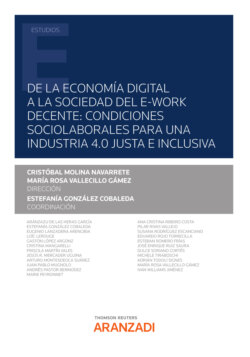Читать книгу De la economía digital a la sociedad del e-work decente: condiciones sociolaborales para una Industria 4.0 justa e inclusiva - Cristóbal Molina Navarrete - Страница 37
На сайте Литреса книга снята с продажи.
Economic digitalization and the challenges of the modernization of employment policies
ОглавлениеSUMMARY: I. INTRODUCTION. II. GENERAL CONSIDERATIONS ON THE DIGITIZATION OF THE ECONOMY AND REASONS FOR INTERVENTION IN EMPLOYMENT POLICY. 1. Some data that support the reasons. 2. A special challenge: the requalification of workers and the necessary skills training. 3. Artificial Intelligence and the disruption of employment. III. THE CURRENT STATE OF COMMUNITY REGULATIONS ON EMPLOYMENT POLICY. 1. Commission Recommendation (EU) 2021/402 of 4 March 2021 on an effective active support to employment following the COVID-19 crisis (EASE). 2. Regulation (EU) 2021/1057 of the European Parliament and of the Council of 24 June 2021 establishing the European Social Fund Plus (ESF+) and repealing Regulation (EU) No 1296/2013. 3. Regulation (EU) 2021/1056 of the European Parliament and of the Council of 24 June 2021 establishing the Just Transition Fund. 4. Regulation (EU) 2021/1060 of the European Parliament and of the Council of 24 June 2021 laying down common provisions on the European Regional Development Fund, the European Social Fund Plus, the Cohesion Fund, the Just Transition Fund and the European Maritime, Fisheries and Aquaculture Fund and financial rules for those and for the Asylum, Migration and Integration Fund, the Internal Security Fund and the Instrument for Financial Support for Border Management and Visa Policy. IV. THE REGULATORY RESPONSES OF SPAIN TO THE DIGITIZATION OF THE LABOR MARKET THROUGH INTERVENTION IN THE AEP. 1. The Recovery, Transformation and Resilience Plan as a star document for the reinforcement and modernization of the AEP. 2. The new Employment Support Strategy 2021-2024. 3. Law 7/2021 of May 20, on climate change and energy transition and the draft of the ITSS Strategic Plan 2021, 2022, 2023. V. CONCLUSION: THE CHALLENGES FOR THE MODERNIZATION OF THE PES. BIBLIOGRAPHY.
Abstract: Successive economic and health crises have slowed down the necessary renewal of active employment policies, outdated for decades and poorly adjusted to the needs of the labor market. However, in recent months, documents, reports and regulations have been published from different institutions–European and national–that make us think about the possibility of updating the policy. As well in the general field of labor relations, the acceleration of technological changes to labor markets and productive activity, also seems to be an impetus given the need for a new approach in the design of the employment activation policies. An effective instrument is needed to facilitate and promote access to the labor market for all workers, but also their term, training and qualification to respond to the requirements of the productive activity that pushes in an accelerated way before the digitization of the economy.
Keywords: Digitization, Artificial Intelligence, employment policies, training.
